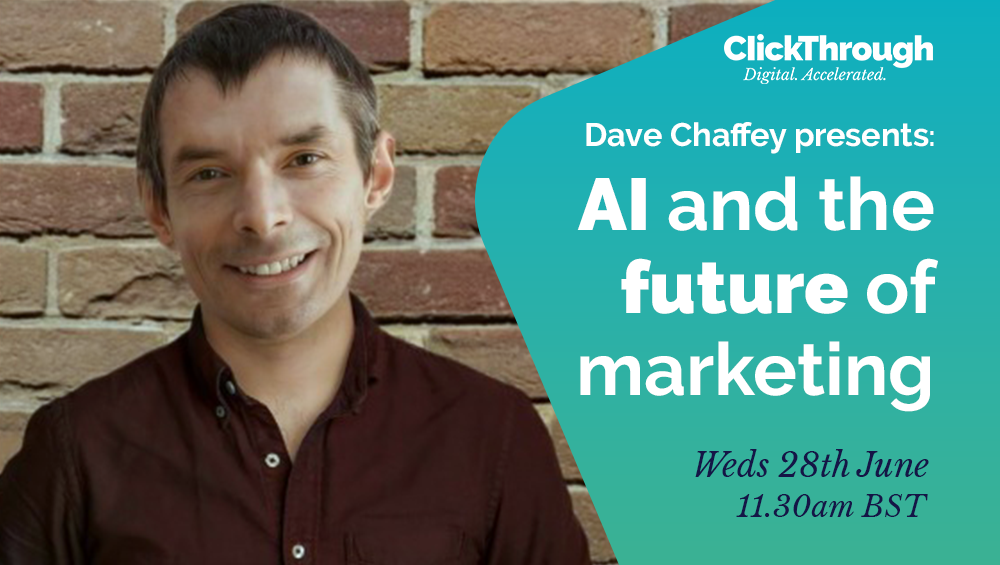With ChatGPT and generative AI becoming more prominent, Dr Dave Chaffey talks through how to review the marketing opportunities AI can bring to your activity.
AI Marketing Opportunities
2023 has been a rare year in marketing, where the latest MarTech innovations discussed have crossed over into the mainstream.
Of course, this has been prompted by the huge interest in ChatGPT, not only for marketing, but in many other applications.
With OpenAI, Microsoft and Google all competing to offer the best platforms for using generative AI, and the corresponding media hype and fear about the potential dangers of it, it is easy to have missed the larger picture for marketers.
For marketers, the interest in ChatGPT and AI is an opportunity to review the best future investments in using this technology while you have the attention of budget holders.
In our next webinar, on AI and the Future of Marketing, Chris Roberts, Al Rowe and I will be discussing the options and reviewing the decision points that businesses need to navigate.
In this article, I’ll introduce the range of options available for using AI to support your marketing and ask how you can review which could be the best options to enhance your activity.
Do You Need An AI Strategy?
While the advent of ChatGPT may prompt colleagues to ask ‘What is our AI strategy?’, this is, of course, the wrong way to look at it.
Instead, as with all MarTech, the question is what can we invest in which will best support the future needs of the business, to make our marketing communications more effective through improving the efficiency of our investments in media, and improving our customer experiences to better engage our audiences with our brand.
So, for me, the current interest in AI is an opportunity to review your investments in MarTech and how they can support all marketing operations and the provision of insight to the business.
While you may get some tactical benefits from deploying generative AI tools powered by GPT and similar Large Language models, there are bigger opportunities that warrant a wider review.
Taking this broader view is, however, challenging given the range of technologies available - the latest 2023 Marketing Technology Landscape Supergraphic from Scott Brinker, who has been cataloguing the range of applications available, now has more than 11,000 solutions! Many of these have now been rebadged as having AI features which will vary vastly in quality and relevance.
What is clear, is that it’s beneficial to review your current MarTech capabilities against others and to identify gaps and AI solutions can be part of that.
While Scott’s supergraphic is no longer really a practical tool, it is instructive to review your MarTech stack against your peers and identify gaps in capabilities and challenges with integration and the implications for return on investment - are you getting your Return on MarTech?
I find the entries into the Stackies useful as a way of understanding the state of the art in MarTech stacks. Take a look at the 2022 Stackies.
My view is that the most useful stacks relate how businesses use their MarTech to support communications across the customer lifecycle. Examples of businesses taking this approach in the latest Stackies include Autodesk, Rabobank and Juniper Networks.
15 applications of AI in Marketing
Within AI, a similar approach can be used to consider options to support customer lifecycle communications. Long before the current hype, Rob Allen, then a colleague at Smart Insights and I created this visualisation laying out the options.
The visual shows 15 different potential use cases for AI in a business related to the Smart Insights RACE planning framework.
As you can see, the visual started with the options for AI content generation to enhance Reach, showing that even over five years ago there were solutions for creating marketing content with AI, although there are certainly many more today.
The visual reminds us that AI in marketing covers a wide range of different technologies, many of which have been available for some time. Although much of the discussion now is about generative AI, propensity models perhaps hold even greater potential.
These machine learning techniques involve using algorithms to learn from historical data sets, which can then create propensity models. Applied propensity models are when these propensity models are put to work predicting given events- such as scoring leads based on the likelihood of visitors to convert.
In the webinar we’ll talk about some of the tools available and discuss what they can be used for and the risks. We’ll also look at some of the AI-based tools ClickThrough Marketing has created, with a focus on using AI to improve Paid and Organic reach and also to support Conversion Rate Optimisation (CRO).
Reserve your (virtual) seat now, to guarantee your place.

